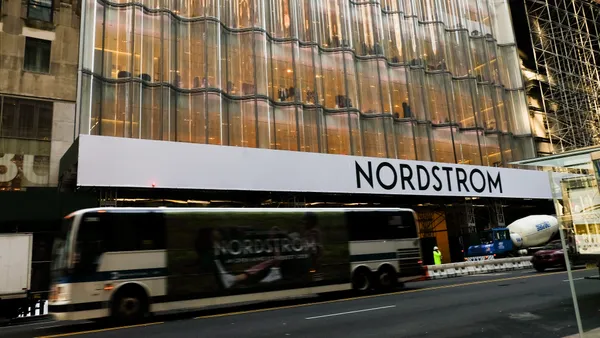Dive Brief:
-
Discount department store J.C. Penney is testing out compact 350-square-foot versions of its Sephora concessions, most of which currently take up about 2,000 square feet, Fortune reports.
-
The smaller format shop-in-shop locations are being tested in Sault Ste. Marie, MI and will sell only Sephora-branded products. If they succeed, the companies could expand the partnership to Penney’s 400 or so smaller-format stores.
-
For the past decade, Sephora has been an extremely successful partner for J.C. Penney, which has consistently announced the addition of yet more stores within stores each year of late; the concessions are now in most of Penney’s 1,000 U.S. stores.
Dive Insight:
The partnership with Sephora represents one of the best moves J.C. Penney has made in recent years, leveraging a concession retailing or “store-within-a-store” approach that works well for both companies: J.C. Penney gets a boost from Sephora’s reputation and traffic, and the beauty retailer elevates its brand visibility.
The concessions typically offer fragrance and beauty products from close to 50 different prestigious brands, including Lancôme, Marc Jacobs Beauty, NARS and Kate Somerville, as well as the Sephora Collection private label. But the new smaller formats will forgo that merchandise assortment in favor of solely promoting Sephora’s private label.
Sephora helped revolutionize beauty retailing, removing the aloofness of the department-store beauty counter and bringing more freedom to try and buy. J.C. Penney's Sephora concessions are smack in the middle of the store. An expansion of the partnership seems natural, considering it gives the mid-tier department store a major differentiator compared to rivals Kohl’s, Sears and Macy’s.
Moody's Investors Service last month upgraded J.C. Penney’s Corporate Family Rating to B1 from B3 and affirmed the company's Speculative Grade Liquidity rating at SGL-1. The rating outlook was changed to stable from positive.
The upgrade of J.C. Penney's ratings reflects its continued improvement in operating performance in the face of challenging market conditions for the department store sector, according to Moody’s. "While we acknowledge the company has had easier comparisons than most of its peers, its continued progress has resulted in significant deleveraging which is evidence of the traction of its initiatives and the recovery of market share," Moody’s vice president Christina Boni said in a statement emailed to Retail Dive.














